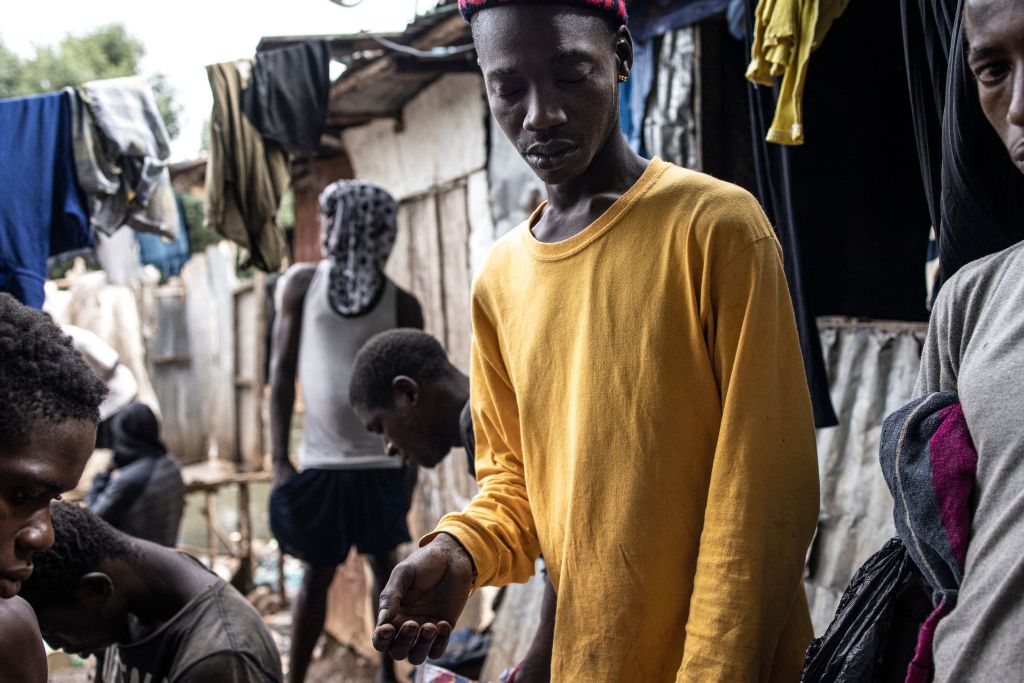ADF STAFF
Sierra Leonean President Julius Maadi Bio in early April declared a national emergency over rampant drug abuse, particularly of kush, a powerful, synthetic psychoactive drug that has killed hundreds of users.
Known for its long-lasting euphoric effects, kush is traditionally made from marijuana, herbs, disinfectants and fentanyl. But users in Sierra Leone have begun mixing those ingredients with ground human bones, which are said to make the drug more powerful due to their high sulfur content. Experts do not believe this ingredient has a significant effect on the drug potency.
Also known as “the zombie drug,” kush can cause users to fall asleep while walking, sometimes into traffic. They can bang their heads against walls and fall from buildings.
‘It Takes Me to Ecstasy’
Amara Kallon, 21, was among a throng of young people huddled beneath a bridge near a market in Freetown, the national capital. Around Kallon, addicts aimlessly shuffled in circles, their shoulders slouched and heads cocked sideways.
“When I smoke kush, I forget my problems. It usually takes me to ecstasy,” Amara, who is homeless, told The Telegraph. “I used to smoke a couple of slings of marijuana a day but after I was introduced to kush by friends, I never turned back. I sold my clothes and books to satisfy my addiction. I started stealing household items, phones, pots and dishes to buy drugs.”
The price of kush makes it an attractive option in a nation with a youth unemployment rate of 60%. A single joint can cost just 5 leones (far less than 1 cent) and the effects can last for several hours.
The low cost comes with high risks. Users often complain of pounding pain in their head, neck and joints. It can cause limbs to swell and organs to fail and trigger severe mental health issues.
Hospital Admissions Surge
According to the BBC, kush-related admissions to the Sierra Leone Psychiatric Teaching Hospital surged by almost 4,000% between 2020 and 2023.
The number of kush-related referrals to the hospital keeps rising. Many users are sedated upon arrival due to violent tendencies such as banging their heads against walls. Most are young men between 18 and 25.
“The kush drug crisis is everywhere, but only a few are referred and most of those treated end up relapsing,” Dr. Jusu Mattia, acting medical superintendent at the hospital, told The Telegraph.
Dr Edward Nahim, a consultant psychiatrist at the hospital, said kush is as dangerous as cocaine and heroin.
“The lack of jobs and opportunities is a driving force leading many youths into drug addiction after the disruption of economies by the COVID pandemic,” Nahim told The Telegraph.
According to the United Nations, 60% of Sierra Leoneans between 15 and 35 are unemployed or underemployed.
Tamba Bockarie started smoking kush in 2021. Bockarie dreamt of someday running a business until kush turned his life into a nightmare. But he told AfricaNews that he quit using the drug in February.
“I had to reflect my mind back from all the challenges I’ve been through in the past and I realized I was responsible for some of the challenges that have happened in my life,” Bockarie said. “I also reflected on the positive side and realized there’s a better room for improvement for me to make it up in life. So that’s why I decided that it’s never too late in my life.”
A Grim Way to Meet Demand
Demand for kush has pushed dealers to rob graves to meet demand. In response, the government has deployed police officers to guard cemeteries and prevent people from digging up human remains.
President Bio has also directed officials to set up a National Task Force on Drugs and Substance Abuse, which will primarily focus on battling the kush crisis. He said he wants rehabilitation centers established in every district that will be “adequately staffed by trained professionals to offer care and support to people with drug addiction,” the BBC reported.
“Now that government has now put state of emergency on kush we should use the other apparatus or the setup stage that was done for COVID and Ebola for us to use those structures — community structures, health structures and psychosocial structures. And the community empowerment structures,” Habib Taigore Kamara, executive director of Social Linkages for Youth Development and Child Link, told AfricaNews
Analysts say the scourge has now spread to neighboring Guinea, which has recorded 10 kush-related deaths this year, and Liberia.

